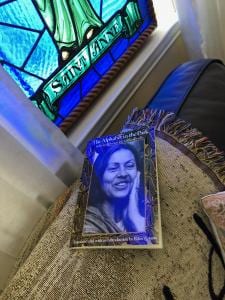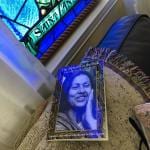Adelia Prado is a primary teacher that embeds a doctoral seminar in her simplest lessons.
 She gives us an alphabet to spell the words that can capture real life, both what is and what should be. Adelia Prado begins simply and helps us build a complex view of God’s world that we inhabit. We are helped because Prado is tied to her region of Brazil, to her language, and only after expressing that experience does she move to the universal. In English translation, we can only get a hint of the glories, but still she is worth reading, studying, reflecting.
She gives us an alphabet to spell the words that can capture real life, both what is and what should be. Adelia Prado begins simply and helps us build a complex view of God’s world that we inhabit. We are helped because Prado is tied to her region of Brazil, to her language, and only after expressing that experience does she move to the universal. In English translation, we can only get a hint of the glories, but still she is worth reading, studying, reflecting.
Historically, upper class people, our betters, told us their feelings and experiences. We had to learn their folk ways, understanding the English vicarage was worthwhile to get the beauty and glory of Jane Austen. Prado starts where she lives, less privileged, working class and so we need to learn her ways. If a child did not grow up with papayas as a common fruit, then one must learn from Prado the yellowness and see something new by means of that increase in our visual vocabulary. She smells the gas in the lantern and this infects the taste of the mail.
This has not happened to me, or perhaps you, but Prado describes what did happen to her and so we (almost) can taste the gas in the rice and beans and thick macaroni. Suddenly this is like eating near the bug zapper at home and the ozone smell that could twist the flavor of hamburgers. These are like and not alike, one not more human than the other, but both tellable by her alphabet of experience.
She is a lady made, not born. When she aspires to write, this aspiration is in the context of her church, of Saint Francis, of being passionate. Prado gives the woman’s desires as normative and the males may get one lesson in how a particular woman thinks and feels. Her particular experience is not “all women,” some are born matrons, but just as there are universal human themes, so there may be some alphabet here common to womankind.
I cannot know, yet there are suggestions in her work. Our ability to understand her very particular poetic alphabet, the accessibility of her images, allows us hope to understand. The common human desire, female desire, begins in Adelia’s desire. She is a woman and so human. The particulars, that cannot be fully understood by anyone but Adelia and God, get letters, icons, images, that are common enough that we can use those letter, icons, images to compare our heart’s desire to her own. This ability to translate or compare desires is a sign of common humanity and a good Creator God.
Heart’s Desire
I am no matron, mother of warriors, Cornelia
but a woman of the people, mother of children, Adelia.
I cook and I eat.
Sundays I bang the bone on the plate to call the dog
and toss out the scraps.
When it hurts, I yell ouch,
When its good, I am brutish,
impulses beyond control.
But I have my crying spells,
little clarities behind my humble stomach,
and a booming voice for hymn singing.
When I write the book bearing my name
and the name I will give it, I’ll bring it to a church,
to a tombstone, to the wilderness,
to cry and cry and cry,
elegant and odd as a lady.












